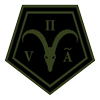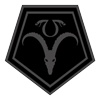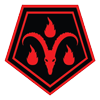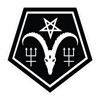إبلیس Iblis the Imagination
by Etu Malku

The Ahl-i Haqq (People of Truth) are a Kurdish sect that practices an extreme form of Shi’ism, Sufism, Gnosticism, and Shamanism. Of the various subgroups, the Shaitan-Parastiyyan sect venerates the Abrahamic Satan. Here Satan is understood as the way of expression through the self, a projection of one’s own spiritual imperfection. The Western Left Hand Path would understand this in the phrase “Wisdom through Adversity” and that this is the path of spiritual alchemy (al-Khemia). Satan is Iblis also known earlier as Azazel and of smokeless fire as the djinn are. As the story goes Iblis /Azazel / Satan would not bow before the Created Man (Adam) because this Man is below Him and He is below Allah, to whom He shall only serve. If we are to embrace Western Left hand Path cosmology we realize that Allah / Yahweh / El is our Greater Self and that our Dæmon is Azazel and we are Iblis the fallen Lucifer. Our Dæmon shall never bow to our human self, for the Dæmon only serves our Greater Self.
Iblis is symbolized as a Black Light (Flame), known as the Dark Tresses of the Beloved and the Guardian of the Inner Realm. Here are the alchemical Midnight Sun and the Hindu concept of Maya which enlightens us to the objective universe as illusion and seduction, at times revealing the face of the Beloved (Greater Self) and at other times veils it. It is Iblis who represents the Isolate Intelligence of all sentient beings. He is not the Christian devil nor the worship of Satanists who allow their beliefs to be governed by the Abrahamics, for Iblis is the Perfected Man, or in the words of Ibn Arabi, “The Greatest Shaykh”. Iblis does not supplement himself before the intellect, for Iblis is the Imagination. The powers of man, both spiritual and physical become obedient to the spirit, but the imagination does not. The Arabic term is ‘Wahm’ and may be interpreted as the ‘imaginal faculty’, without images there will be no spiritual realization for Reality that can only be experienced through its manifestation. Iblis is the Guardian of the Threshold, an ambiguous and liminal No-Place, the land of the Imagination . . . a desert. Evil is a relative experience.
“The imagination is not a State: it is the Human existence itself. Everything that is possible to be believed is an image of the truth” – William Blake
In the West, only William Blake recognized the Devil as the imagination; in Sufism, this identity has been clear since at least the tenth century. The Sufis who defended Satan were not defending or excusing evil, but rather telling a secret: “evil” has only a relative existence, and it is “merely human.” It is the “shaitan” in each of us which we must “convert to Islam”. This is Self-Alchemy, the exacting power of our Imagination. Here we find the Black Light.
The concept behind Iblis / Azazel is more complex than merely disobeying Allah. The Western Left Hand Path is the way of non-union. Iblis is the first model of separation of ‘I’ and ‘Consciousness’ independent of the Absolute (God). In this, Iblis represents one’s subjective universe (imagination) and antinomianism, both necessary ideals behind the Western Left Hand Path. No matter the various schemes that create the Azazel mythos, his realm is that of the desert, of a lonely wilderness representing the nomadic Arabs and he is a supreme spiritual creature symbolizing the Light within a depthless Darkness. Iblis is this Imagination that activates our faculty of anamnesis in order to envision the divine within. Iblis is the imagination that refuses to prostrate itself before the intellect. In terms of a Platonic First Form or Ideal, Iblis is the model by which ‘I’ becomes separate from ‘Consciousness’, independent of Tawhid or the Absolute. To worship Iblis is to be wahid aldhy yafsil واحد الذي یفصل (one who is separated), those who thrive in a state separate from Allah (objective universe). In this light Iblis is the custodian of one’s Inner Divinity where he is the Keeper of the Black Light which is beyond all duality.
from كتاب العواء في لیلة الصحراء
The Book of Howling in the Desert Night
Kitab Eawa’ fi Laylat Alsahra’
‘Amir Alzzalam





